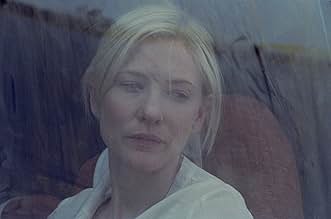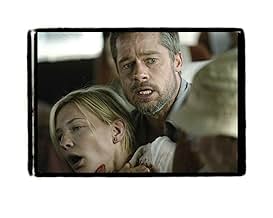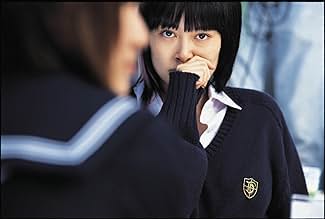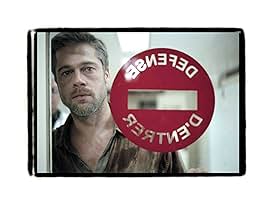Babel
- 2006
- Tous publics
- 2h 23min
La tragédie touche un couple marié en vacances dans le désert marocain, déclenchant une série d'évènements impliquant quatre familles différentes.La tragédie touche un couple marié en vacances dans le désert marocain, déclenchant une série d'évènements impliquant quatre familles différentes.La tragédie touche un couple marié en vacances dans le désert marocain, déclenchant une série d'évènements impliquant quatre familles différentes.
- Réalisation
- Scénario
- Casting principal
- Récompensé par 1 Oscar
- 45 victoires et 137 nominations au total
Avis à la une
I loved "Amores Perros" It was revolutionary in so many ways and smelled like the real thing even if I couldn't quite put my finger as to what the real thing really was. "21 Grams" had gigantic intentions and superb performances but didn't feel quite revolutionary because we had kind of seen it before - and better - in "Amores Perros". Now "Babel" and, my goodness, the first thing that comes to mind is, what an extraordinary filmmaker Inarritu really is. I suspect that his universe, even if it feels infinite, it is framed - beautifully so - between the walls of biblical references. His methods may be way ahead of the times but the roots are as ancestral as fire itself. I'm not sure where I want to go with all this but the question is, Inarritu is taking me places and that's what I long for in a filmmaker. He's not taking any of us for granted and I'm very grateful for that. His movies are experiences and I for one can't wait for the next one.
There's something unique to film, something relatively new in the word that has had profound effect on how we relate to art.
I call it noir, and define it a bit differently than the ordinary fellow, who thinks it has something to do with dark shadows and unhappy endings.
For me, noir is centered on the idea that the camera represents our eyes; that the nature of the world we see is bent by us watching it; and that the fate of the characters in that world are arranged sometimes by extreme coincidence for our purposes. The extreme photography is an indicator of that eye, and not necessarily a characteristic of noir. The camera might not be cinematically introduced, though of course it usually is.
I'm interested in the evolution of noir because its right at the edge of how we construct narrative, how we experiment with ideas and the stories we swim in. But what does a filmmaker do if that edge is always moving? Nearly every film I see that was made recently has some twist on the exploration this is how genres mature today, and how we build tools to see ourselves.
For some reason, its the Spanish-speaking filmmakers that are doing the most interesting work in pushing this further, and effectively.
What Iñárritu does is especially adventurous. I particularly appreciate it because instead of rattling around in established cinematic conventions, he's trying to extend to new ones. Well, not precisely new, but newly recast. I like his idea of narrative braiding, but that's only part of his adventure on the edge. Its what he leaves out that matters. The absences aren't noticed because of the way things are sliced and respliced. And people think the story is important, which of course it isn't, just a pointer: here generally misinterpreted as miscommunication. Deliberately so, I think.
Those elided parts mean that we fill in more of the story than usual, that the container of a long form film can be bigger than usual. That it presents an open world. What's new for Iñárritu is the notion of referring to large sweeps of society as metaphors; and also new is the idea of lacing watchers in the story, here a disembodied global TeeVee audience. They "watch" but of course see almost nothing of what we see.
Its about listening transformed into watching; each of the three threads involves watching. The Japanese episode of course literally has watching as listening and the lasting trauma of what has been seen. The Morrocan episode is triggered by a boy spying on his nude, colluding sister, and on the Brad Pitt side about a reluctant busload of watchers. The Mexican story has a woman going to see her son's wedding and having trouble with being seen clumsily.
Sight. Made explicit of course by the cinematic flourishes, the deliberate differences in the three camera stances, whose differences penetrate to primitives beyond grain, light, stance to the soul of the eye. Its as if Iñárritu decided to create three of the most elementary braids of sight he possibly could with the notion that their cleanliness would allow them to braid into a larger container than any other film.
Its one of the most exciting things happening. Almost thankfully he underused Cate, who is one of the few actresses who could hint that everything other than her we see is in her mind. Almost thankfully he underplays the merger into one soul of three wonderful actresses.
Almost, but not quite thankfully, he only hints at the notion of detective work, three types of discovery.
Its delicate, good, rich, dangerous without seeming so.
Ted's Evaluation -- 3 of 3: Worth watching.
I call it noir, and define it a bit differently than the ordinary fellow, who thinks it has something to do with dark shadows and unhappy endings.
For me, noir is centered on the idea that the camera represents our eyes; that the nature of the world we see is bent by us watching it; and that the fate of the characters in that world are arranged sometimes by extreme coincidence for our purposes. The extreme photography is an indicator of that eye, and not necessarily a characteristic of noir. The camera might not be cinematically introduced, though of course it usually is.
I'm interested in the evolution of noir because its right at the edge of how we construct narrative, how we experiment with ideas and the stories we swim in. But what does a filmmaker do if that edge is always moving? Nearly every film I see that was made recently has some twist on the exploration this is how genres mature today, and how we build tools to see ourselves.
For some reason, its the Spanish-speaking filmmakers that are doing the most interesting work in pushing this further, and effectively.
What Iñárritu does is especially adventurous. I particularly appreciate it because instead of rattling around in established cinematic conventions, he's trying to extend to new ones. Well, not precisely new, but newly recast. I like his idea of narrative braiding, but that's only part of his adventure on the edge. Its what he leaves out that matters. The absences aren't noticed because of the way things are sliced and respliced. And people think the story is important, which of course it isn't, just a pointer: here generally misinterpreted as miscommunication. Deliberately so, I think.
Those elided parts mean that we fill in more of the story than usual, that the container of a long form film can be bigger than usual. That it presents an open world. What's new for Iñárritu is the notion of referring to large sweeps of society as metaphors; and also new is the idea of lacing watchers in the story, here a disembodied global TeeVee audience. They "watch" but of course see almost nothing of what we see.
Its about listening transformed into watching; each of the three threads involves watching. The Japanese episode of course literally has watching as listening and the lasting trauma of what has been seen. The Morrocan episode is triggered by a boy spying on his nude, colluding sister, and on the Brad Pitt side about a reluctant busload of watchers. The Mexican story has a woman going to see her son's wedding and having trouble with being seen clumsily.
Sight. Made explicit of course by the cinematic flourishes, the deliberate differences in the three camera stances, whose differences penetrate to primitives beyond grain, light, stance to the soul of the eye. Its as if Iñárritu decided to create three of the most elementary braids of sight he possibly could with the notion that their cleanliness would allow them to braid into a larger container than any other film.
Its one of the most exciting things happening. Almost thankfully he underused Cate, who is one of the few actresses who could hint that everything other than her we see is in her mind. Almost thankfully he underplays the merger into one soul of three wonderful actresses.
Almost, but not quite thankfully, he only hints at the notion of detective work, three types of discovery.
Its delicate, good, rich, dangerous without seeming so.
Ted's Evaluation -- 3 of 3: Worth watching.
Alejandro González Iñárritu's two previous films, Amores Perros and 21 Grams, dealt with the subject of very different people being connected on a small scale. Babel takes a different approach, but has the same central theme. The plot follows four different stories that stretch the entire globe (Morocco, Japan, Mexico and a few minutes in America) and shows how one single bullet can effect the lives of people so far apart. Guillermo Arriaga's script is breathtaking and perfectly structures this vast array of characters. Within minutes of being with them, we know exactly who they are and what drives their current personality. This gives time for the epic story to play out.
It's all centered around two young boys who are fooling around with a rifle and accidentally shoot American tourist Susan (Cate Blanchett) who is on "vacation" with her husband Richard (Brad Pitt). Though never directly saying it, it's quite clear that one of their son's died and Richard panicked and left his family behind; leaving Susan to care for their two remaining children. He came back and their vacation to Morocco was really just an excuse for them to get away and try to get their marriage back together. Ultimately it does bring them back to each other, but it takes tragedy to do so. Brad Pitt's performance is one of the finest of 2006 and his internal pain and emotional strength manage to bring a river of tears flowing from my eyes. It's his best performance since Twelve Monkeys and further proves that through all of the controversy of his social life, he's still a phenomenal actor. Back in America, their nanny Amelia (Adriana Barraza) is taking care of their two children while they are gone. Through unfortunate circumstances she has to bring them to Mexico for her son's wedding and things take a huge turn for the worse when they try to cross back over into America.The final story is a much further departure from the rest of the characters. It centers around a deaf-mute Japanese schoolgirl named Chieko (Rinko Kikuchi) who struggles with the pain of being so different from everyone else along with her mother's apparent suicide and the police's attempt at questioning her father about a gun he gave to a Moroccan man (the gun used to shoot Susan).
While most people believe that the film is about how people living so close to each other can be so different, I actually feel that it's the exact opposite. I think it's a story of how people so far apart (on different continents, speaking different languages) are almost exactly alike. All of the stories center around similar themes; loneliness, alienation, depression, the loss of a loved one and more while Arriaga never forgets to subtly mention the political outrage that comes from an American woman being shot in a foreign country. Every character feels the same emotions, deals with similar pain and are all connected by this single shooting. Babel starts off as a film about very different people in very different worlds, but ends up being one studying human nature and showing that even when we're worlds apart people we can still be so similar. All you have to do is listen.
It's all centered around two young boys who are fooling around with a rifle and accidentally shoot American tourist Susan (Cate Blanchett) who is on "vacation" with her husband Richard (Brad Pitt). Though never directly saying it, it's quite clear that one of their son's died and Richard panicked and left his family behind; leaving Susan to care for their two remaining children. He came back and their vacation to Morocco was really just an excuse for them to get away and try to get their marriage back together. Ultimately it does bring them back to each other, but it takes tragedy to do so. Brad Pitt's performance is one of the finest of 2006 and his internal pain and emotional strength manage to bring a river of tears flowing from my eyes. It's his best performance since Twelve Monkeys and further proves that through all of the controversy of his social life, he's still a phenomenal actor. Back in America, their nanny Amelia (Adriana Barraza) is taking care of their two children while they are gone. Through unfortunate circumstances she has to bring them to Mexico for her son's wedding and things take a huge turn for the worse when they try to cross back over into America.The final story is a much further departure from the rest of the characters. It centers around a deaf-mute Japanese schoolgirl named Chieko (Rinko Kikuchi) who struggles with the pain of being so different from everyone else along with her mother's apparent suicide and the police's attempt at questioning her father about a gun he gave to a Moroccan man (the gun used to shoot Susan).
While most people believe that the film is about how people living so close to each other can be so different, I actually feel that it's the exact opposite. I think it's a story of how people so far apart (on different continents, speaking different languages) are almost exactly alike. All of the stories center around similar themes; loneliness, alienation, depression, the loss of a loved one and more while Arriaga never forgets to subtly mention the political outrage that comes from an American woman being shot in a foreign country. Every character feels the same emotions, deals with similar pain and are all connected by this single shooting. Babel starts off as a film about very different people in very different worlds, but ends up being one studying human nature and showing that even when we're worlds apart people we can still be so similar. All you have to do is listen.
The film opens in the Moroccan desert: an elderly tribesman trades a high-powered rifle to a goat herder for 500 diram & a goat. He hands the rifle to his two young sons and tells them to kill jackals with it, to protect the herd. As practice, the start shooting at rocks, a car passing on the hill below, and finally a bus. That's the only thing they manage to hit, putting a bullet through the shoulder of a tourist. In the middle of nowhere, there's no medical help, and no one wants to wait with the injured person except her husband. That's the setup of this complex, challenging film. It splits into four related stories, one in Japan, two in Morocco, and the last in California, where a housekeeper has to get to her son's wedding in Mexico, but has no one to watch the two children in her care. She decides to take them along, and of course things go sour. A good cast, great acting, fine cinematography, and expert direction make this film well worth watching. It's not for everyone, but for people who are ready to see deliberately paced low-key thriller, this is one good film. The split story line is reminiscent of "Syriana," but in no way copies it.
I'm generally not a fan of non-linear storytelling in films - there is usually no reason for it and it can be frustrating and difficult to follow the plot. While the plot in 'Babel' is relatively easy to follow, the film still suffers the same annoying problems as other non-linear films.
The most irritating thing for me is how scenes that are connected and happening at the same time are presented so far apart. At the very start of the film we see kids fire a bullet at a coach, yet the scene that logically goes together with this from inside the coach does come until a significant while later.
The viewer also never gets to properly know any of the characters - there's no time for any character development as the film is constantly going back and forth between characters and situations. As a result, you don't really care for what happens to any of them.
The saving grace of 'Babel' is its ending, which brings everything together and wraps the story up nicely. Even though it can be a frustrating watch at times, 'Babel' is a smart and well-made film.
The most irritating thing for me is how scenes that are connected and happening at the same time are presented so far apart. At the very start of the film we see kids fire a bullet at a coach, yet the scene that logically goes together with this from inside the coach does come until a significant while later.
The viewer also never gets to properly know any of the characters - there's no time for any character development as the film is constantly going back and forth between characters and situations. As a result, you don't really care for what happens to any of them.
The saving grace of 'Babel' is its ending, which brings everything together and wraps the story up nicely. Even though it can be a frustrating watch at times, 'Babel' is a smart and well-made film.
Le saviez-vous
- AnecdotesThe scene where Chieko (Rinko Kikuchi) and her father are in the car together was shot without filming permission from the city due to slow Japanese bureaucratic procedures. The crew created "man-made" busy traffic, and began shooting the scene. Later the police started chasing them while still shooting the scene.
- GaffesAfter the wedding, Amelia, her nephew and the Jones children use the Tecate border crossing to reenter the USA. After fleeing, we are shown a sandy, wide desert where they wander. Actually, the Tecate border crossing is in the mountains, there is no such desert within a reasonable distance on the USA side. What is shown looks like an Arizona border crossing.
- Citations
Mike Jones: My mom said Mexico is dangerous.
Santiago: [in Spanish] Yes, it's full of Mexicans.
- Bandes originalesPara Que Regreses
El Chapo
Gabriel Ramirez
Maximo Aguirre Music Publishing, Inc.
D Disa Latin Music, S. de R.L. de C.V
Meilleurs choix
Connectez-vous pour évaluer et suivre la liste de favoris afin de recevoir des recommandations personnalisées
Détails
- Date de sortie
- Pays d’origine
- Langues
- Aussi connu sous le nom de
- Tháp Babel
- Lieux de tournage
- Sociétés de production
- Voir plus de crédits d'entreprise sur IMDbPro
Box-office
- Budget
- 25 000 000 $US (estimé)
- Montant brut aux États-Unis et au Canada
- 34 302 837 $US
- Week-end de sortie aux États-Unis et au Canada
- 389 351 $US
- 29 oct. 2006
- Montant brut mondial
- 135 330 835 $US
- Durée2 heures 23 minutes
- Couleur
- Mixage
- Rapport de forme
- 1.85 : 1
Contribuer à cette page
Suggérer une modification ou ajouter du contenu manquant


































